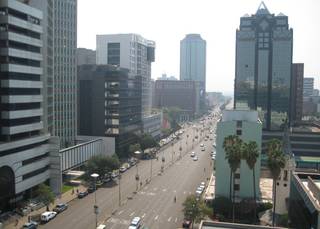Not too long ago, Raphael Tenthani interviewed the current British High Commissioner to Malawi, Michael Nevin.In the interview, Mr Nevin is quoted as claiming that Malawi would have become a failed state if President Joyce Banda had not listened to the advice of IMF to devalue the Kwacha.
This was not the first time that an envoy from the west has come to Malawi and raised the term “Failed State” to Malawians. During the late Bingu wa Mutharika Administration, as Mutharika defied the west and implemented what eventually became the highly successful fertiliser subsidy program, he was blocked and severely criticized by the western donors who threatened that by implementing such a program, Malawi would become a “Failed State”. They declared that the program was unsustainable and would draw heavily on the government’s already scarce resources, making the country’s economy unmanageable.
It seems that the dreaded term “Failed State” is conveniently invoked to threaten developing countries into submission to western policies that are contrary to their own interests. Considered in the context used by Mr Nevin in the interview referred to above, the term is meant to threaten and silence Malawians critical of President Joyce Banda’s reckless devaluation. Mr Nevin is once again typically flagging the dreaded “Failed State” to intimidate Malawians into supporting president Banda’s devaluation and floatation of the Kwacha, which as all Malawians can clearly see was more in the interests of western businessmen than ordinary Malawians. Mr Nevin in fact makes this clear in the interview when he states, “exporters to Malawi believe they are getting a fairer price, as do exporters from Malawi”. These are the people that are benefiting from the devaluation, not ordinary Malawians. In the aftermath of the massive devaluation, ordinary Malawians now must deal with astronomical prices and out-of-control inflation.
This article attempts to show that the term “Failed State” is so indistinct and uselessly vague that it should not worry any leaders of developing countries, particularly when waved in their face by propagators of modern western imperialism. Further, this article argues that the United States and its allies are actually engaged in the active manufacturing of so-called failed states in order to bully developing nations and to threaten them into complying with their agenda.
2. DEFINING “FAILED STATE”
There is no real consensus as to what the term “Failed State” actually means. The lack of a definitive meaning may be a deliberate tactic by those that regularly use the term. All that developing countries know for sure is that they do not want their country to be referred to with such a negative connotation. Minh Nguyen in “ The Question of “Failed States”: Australia and the Notion of State Failure” states that “Although widely referred to, the concept of failed states is not only indistinct; it is highly controversial because of the political and security implications of labeling a state as having ‘failed’. A state that has been declared as having failed becomes a candidate for intervention in its internal affairs by another state or international organization, or worse still, marked for a preventative military invasion.”
One would have thought that with such far-reaching implications, the term would not be used willy-nilly, and that there would be definitive criteria for assessing this so called state failure. Yet the truth quite simply is that the term is used in reference to so many situations to the point of really meaning nothing.
William Zartman offered a broad definition, arguing the ‘social contract’-based definition of state failure for whom state failure is said to occur when “the basic functions of the state are no longer performed”. He considered that it is “a deeper phenomenon than mere rebellion, coup, or riot. It refers to a situation where the structure, authority (legitimate power), law, and political order have fallen apart”.
Other commentators have taken an even broader view, defining a failed state as a state that has failed at some of the basic conditions and responsibilities of a sovereign government. The definition of a failed state according to the Fund for Peace usually refers to a number of prevailing situations.
These are a loss of control of its territory, or of the monopoly on the legitimate use of physical force therein; erosion of legitimate authority to make collective decisions; an inability to provide public services; or an inability to interact with other states as a full member of the international community.
Common characteristics of a failing state include a central government so weak or ineffective that it has little practical control over much of its territory; non-provision of public services; widespread corruption and criminality; refugees and involuntary movement of populations; and sharp economic decline.
3. EXAMPLES OF FAILED STATES
In is quite revealing that the black list of so-called Failed States is conceived and released by the United States. Since 2005, United States think-tank Fund for Peace and the magazine Foreign Policy, publish an annual index called the Failed States Index.
The index is based on 12 indicators, which include:
Social indicators
1. Demographic pressures: including the pressures deriving from high population density relative to food supply and other life-sustaining resources.
2. Massive movement of refugees and internally displaced peoples.
3. Legacy of vengeance-seeking group grievance: based on recent or past injustices, which could date back centuries.
4. Chronic and sustained human flight: both the “brain drain” of professionals, intellectuals and political dissidents and voluntary emigration of “the middle class.” Growth of exile/expatriate communities is also used as part of this indicator.
Economic indicators
5. Uneven economic development along group lines: determined by group-based inequality, or perceived inequality, in education, jobs, and economic status. Also measured by group-based poverty levels, infant mortality rates, education levels.
6. Sharp and/or severe economic decline: measured by a progressive economic decline of the society as a whole (using: per capita income, GNP, debt, child mortality rates, poverty levels, business failures.) A sudden drop in commodity prices, trade revenue, foreign investment or debt payments. Collapse or devaluation of the national currency and a growth of hidden economies, including the drug trade, smuggling, and capital flight. Failure of the state to pay salaries of government employees and armed forces or to meet other financial obligations to its citizens, such as pension payments.
Political indicators
7. Criminalization and/or delegitimisation of the state: endemic corruption or profiteering by ruling elites and resistance to transparency, accountability and political representation. Includes any widespread loss of popular confidence in state institutions and processes.
8. Progressive deterioration of public services: a disappearance of basic state functions that serve the people, including failure to protect citizens from terrorism and violence and to provide essential services, such as health, education, sanitation, public transportation. Also using the state apparatus for agencies that serve the ruling elites, such as the security forces, presidential staff, central bank, diplomatic service, customs and collection agencies.
9. Widespread violation of human rights: an emergence of authoritarian, dictatorial or military rule in which constitutional and democratic institutions and processes are suspended or manipulated. Outbreaks of politically inspired (as opposed to criminal) violence against innocent civilians.
10. Security apparatus as “state within a state”: an emergence of elite or praetorian guards that operate with impunity.
11. Rise of factionalised elites: a fragmentation of ruling elites and state institutions along group lines.
12. Intervention of other states or external factors: military or Paramilitary engagement in the internal affairs of the state at risk by outside armies, states, identity groups or entities that affect the internal balance of power or resolution of the conflict. Intervention by donors, especially if there is a tendency towards over-dependence on foreign aid or peacekeeping missions.
Countries currently on the list in 2011 were Somalia, Chad, Sudan, Democratic Republic of the Congo, Haiti, Zimbabwe, Afghanistan, Central African Republic, Iraq, Cote d’Ivoire, Guinea, Pakistan, Yemen, Nigeria, Niger, Kenya, Burundi, Guinea-Bissau, Myanmar and Ethiopia.
Paul Craig Roberts has, however, argued that the United States is itself a failed state based in the criteria used by the failed state index above. Roberts observes that “the US has every characteristic of a failed state. The US government’s current operating budget is dependent on foreign financing and money creation and the government is too politically weak to be able to advance its interests through diplomacy, [with] costs that are out of control, and priorities that are skewed in the interest of rich organized interest groups at the expense of the vast majority of citizens.”
Additionally, Edward Herman writes, “there is a good case to be made that the United States itself is a failed or failing state. It obviously has not been crushed militarily by any foreign power, but its underlying population has been hugely damaged by its own permanent war system. In this case the military elite, with its contractor, banker, political, media and intellectual allies has greatly enlarged poverty and mass distress, shriveled the public services, and impoverished the country, making it impossible for the hamstrung and compromised leadership to properly service its ordinary citizens, despite steadily rising per capita productivity and GDP.”
But of course since it is the United States that makes the list, it cannot put itself on it.
Yet even more disturbing than that is the growing international perception that the United States actively creates these so called Failed States in order to advance its own imperialistic agenda. Herman points out that in order to perpetuate the arms trade, which brings millions to US based armed companies, “the United States has become a large-scale manufacturer of failed states. By a failed state I mean one that has been crushed militarily or rendered unmanageable by political and/or economic destabilization and a resultant chaos and is unable (or is not permitted) for long periods to recover and take care of its citizens’ needs. Of course, the United States has been such a manufacturer for a long time, as in the cases of Haiti, the Dominican Republic, El Salvador, Guatemala and those Indochinese states where killing was so good.”
4. CONCLUSION
The term “Failed State” is a suspicious and simply convenient American invention. It’s meaning is dubious and Malawians should approach it with scorn and disdain. There are two things that are unfortunate about Mr Nevin’s comments and claim that Malawi would have become a failed state had it not been for the devaluation. First of all, Mr Nevin and others of his group of western representatives should know better than to use this alarmist term in order to deceive Malawians and garner sympathy for their puppet. President Banda is already loyally doing everything they want her to do anyway. On the other hand, perhaps it should not come as a surprise to Malawians that these exploiters and plunderers of Africa can sink this low, for great and despicable indeed are the things, and horribly low are the depths that these nations are alleged to have sunk in order to get their way at the expense of Africans.
Secondly, even if the term “Failed State” were accepted as legitimate, it would be interesting to find out what failed state indicator or indicators Mr Nevin was using when he claimed that Malawi would have become a failed state. Looking at the 12 factors that indicate state failure, it is clear that there are factors that have been brought by the greatly applauded devaluation that are in fact more in line with a failed state than where Malawi was before President Banda took over.
Unfortunately, it will take not a politician of Joyce Banda’s clueless ilk, but a new generation of intelligent and perceptive Malawian politicians to see through Mr Nevin’s ruse and exercise fearlessness to such neo-colonialist notions such as “Failed State”.




